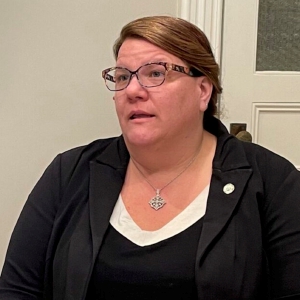As city revaluations begin, owners have right to refuse but leaders implore all to cooperate

The view of downtown Concord from the sixth floor balcony of the new boutique Hotel Concord on Wednesday, July 11, 2018.
|
Published: 07-09-2024 5:10 PM
Modified: 07-09-2024 5:41 PM |
If Concord’s property assessment team encounters a no-trespassing sign on a homeowner’s property while conducting their city-wide revaluation, they’ll leave the site and send a letter in the mail. If a resident isn’t home when the team, marked by neon vests and photo ID cards, visits, they’ll walk around to survey the exterior of the house before sending a notice to come back and look inside.
Taxpayers can then set up appointments for the team to return for the full evaluation. As Concord begins its first city-wide property revaluation in 30 years – likely to start Monday in the South End – residents have the right to refuse entry to their property.
But the two people spearheading the project – Jonathan Rice, Concord’s director of real estate assessments and Stephen Whalen, the project manager for Vision Government Solutions – the firm hired to help carry out the effort – implore homeowners to cooperate with the process.
“People are going to refuse and that’s fine, that’s up to them,” said Whalen. “But the majority of the people, the better the quality of information for data collection and the listing and you end up with a better number on your property.”
While the city has updated property values based on renovation permits and sales, the current evaluation is the first time in decades that assessors will visit the 15,000 properties.
Rice expects the team to start in the South End, but official postings of streets that will be evaluated will be online ahead of the start.
The process begins with staff visiting each lot with a property card. The intent of the revaluation is to verify the information the city has on record – the number of bedrooms, bathrooms and additional features, like sheds or decks.
Still, homeowners are in the driver’s seat for this process, according to Rice.
Article continues after...
Yesterday's Most Read Articles
 As Canadian travel to the U.S. falls, North Country businesses are eyeing this Victoria Day weekend to predict impacts in New Hampshire
As Canadian travel to the U.S. falls, North Country businesses are eyeing this Victoria Day weekend to predict impacts in New Hampshire
 Study finds recyclables valued in millions of dollars tossed in New Hampshire’s waste stream
Study finds recyclables valued in millions of dollars tossed in New Hampshire’s waste stream
 “A dream come true” – Family opens housing for adults with disabilities in Concord
“A dream come true” – Family opens housing for adults with disabilities in Concord
 ‘Friends of the Beav’ want people to see the city’s golf course differently
‘Friends of the Beav’ want people to see the city’s golf course differently
 Helen Hanks resigns as Department of Corrections commissioner
Helen Hanks resigns as Department of Corrections commissioner
 ‘I thought we had some more time’ – Coping with the murder-suicide of a young Pembroke mother and son
‘I thought we had some more time’ – Coping with the murder-suicide of a young Pembroke mother and son
“The owner will determine what is inspected,” he said. “The owner asks us to please leave the property, we will leave the property. We don’t want to be on any property that doesn’t want us.”
The revaluation process begins with the assessing team knocking on the owner's front door to ask permission to survey the property. If given the green light, they’ll walk the exterior of the property, measuring the building and any additional features.
The interior evaluation involves checking the number of bedrooms and bathrooms and whether attics and basements are finished.
If a homeowner does not answer or denies access to the property, the team will do an exterior evaluation without opening gates or fences. They’ll measure the front of the property and then look to see if any backyard features are visible.
The evaluation is less about the content of the property, said Rice – they’ve seen everything from hoarders to pristine renovations – but the city will grade the condition of features.
“When I go to someone's house, I'm not looking at how much laundry they have unfolded in baskets,” said Rice. “I’m looking at the real estate.”
On average, interior inspections take five to 10 minutes, said Whalen. With the information the city already has – from renovation permits or prior sales – the assessing team is merely verifying what is on the current property card.
If a homeowner refuses an appraisal, they still have the right to challenge the final assessment and apply for an abatement. Oftentimes, an abatement request will require an inspection, or proceed to a hearing.
The city’s process will span 18 months, with 6,700 properties assessed this year and the remaining 8,000 completed in 2025. That means that homeowners will not see updates to their assessments – or taxes – until 2026.
While many homeowners fear that a revaluation year will lead to a spike in their assessment, the process is meant to reflect market value, said Rice.
“What you have to ask yourself as a taxpayer is, ‘Is this a fair value in exchange for my property?’” said Rice. “‘If I listed my property for sale, what do I anticipate it selling for?’”
The process includes evaluating all property in the city – commercial, industrial and residential – including those that are tax-exempt.
“We are going to capture five years’ worth of market appreciation or depreciation, depending on the way that the market goes between now and 2026,” said Rice. “That total assessment, whatever it is, will be used in the tax rate setting in 2026.”
The cost of construction and materials can also be a factor in value increases. While a homeowner may think that they’ve made no improvements to their properties, the cost of a window or siding on the house has increased since the last assessment in the 1990s.
“Whether you did anything to your house or not, it's increasing in value, because the cost to replace the house is substantially more today than it was 10 years ago,” said Whalen.
With the current market – where prices are high and inventory is limited – Whalen has also seen an increase to the value of more inexpensive housing, like manufactured homes.
“Now the double wides, the prefab houses, which at one time were cheaper, now that’s a starter house,” he said. “They’re going up faster because there’s more demand for the cheaper, smaller houses and there’s less demand for the larger ones.”
A factor in commercial evaluations is the income and expenses of the building, which the city collects in a report. For a commercial property, like an apartment building, the assessment could be higher than the sole price of the building and land, as a result of the rent the owner charges.
Rice calls this an income override, which would be reflected on the property card.
Any property owner with questions about the assessing process should contact the city’s assessing office at 603-225-8550. The list of streets that assessors will be visiting will be posted on the city’s website.







 Fire at Bradford house kills four pets
Fire at Bradford house kills four pets Penacook parade to commemorate Memorial Day
Penacook parade to commemorate Memorial Day 
